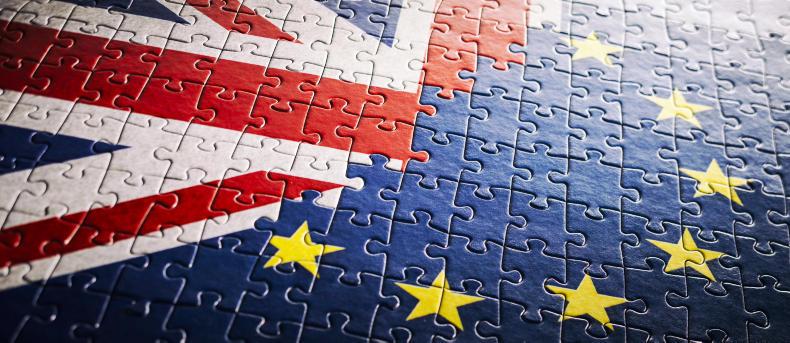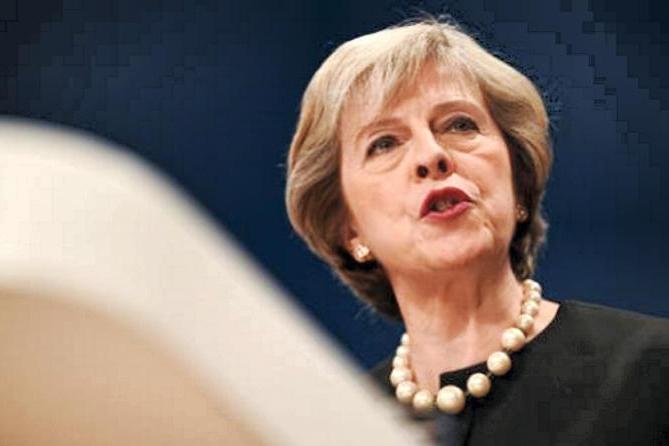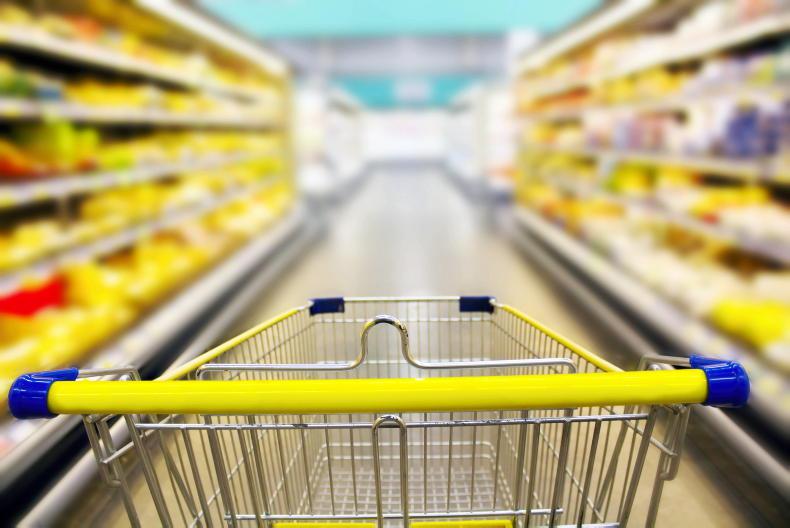With just over a year to go until the UK formally leaves the EU, a resolution to a future trading relationship looks no closer. That is worrying for Irish farmers as agriculture is the most exposed sector of the Irish economy to trade with the UK. Even the most minor disruption to trade will hit Irish farmers hard and, if it is a hard Brexit, many sectors will be wiped out. It is that serious.
The extreme positions on either side mean that in the case of the EU, the UK must not have trade terms as good as when they were a member, whereas the most extreme Brexit thinking dictates that the UK should sail off in isolation and leave what they see as the handcuffs of the EU behind.
Lose-lose
The realities are that either side can adopt the extreme position in confidence that they are respectively big enough economies to survive, come what may. The fact is that the EU 27 is bigger but a looser collection of countries while the UK is a smaller economic entity but still the fifth or sixth largest economy in the world. Notwithstanding the fragmentation at the edges, particularly in Scotland and Northern Ireland, it is also a more cohesive unit than the EU.
The answer lies in a form of constructive ambiguity, and the template has already been established in Theresa May’s most recent speech
The problem with the EU and UK relationship is that it has become defined in political clichés and soundbites, designed to assert political might rather than seriously address what can be done to satisfy the political need in the UK to achieve a full and complete Brexit while ensuring the EU does not have to grant more favourable terms than presently enjoyed.
The answer lies in a form of constructive ambiguity, and the template has already been established in Theresa May’s most recent speech on the subject in the Mansion house a fortnight ago, which was accepted by all shades of Brexit opinion.
Imaginative thinking
In it, she tellingly recognised that she wanted to explore “the terms on which the UK could remain part of EU agencies such as the European Medicines Agency, the European Chemicals Agency, and the European Aviation Safety Agency”.
She even went so far as suggest an appropriate payment and a need to comply with the rules, and a type of associate membership was mooted. The telling part of this section of her speech was that all this could be achieved without compromising the UK’s exit from the EU. Her punchline was that “of course parliament would remain ultimately sovereign. It could decide not to accept these rules, but with consequences for our membership of the relevant agency and linked market access rights.”
Parliament has nuclear option
In other words, the UK would work with EU rules but reserve the right at any point to stop doing so. If that point ever came, they recognised they would be on the outside. However, with parliament having the authority, that satisfies the UK’s particular need in the areas of aviation, chemicals, and medicine.
That begs the question of why stop there with that formula? If the same principle was applied to the fraught discussion around membership of a customs union, then both the EU and UK could achieve their respective objectives.

Some creative thinking could provide the solution to the Brexit puzzle.
Both sides recognise a preference for tariff-free trade and the UK is pledged to no compromise of standards post-membership. That is fundamental for a continued relationship, even if not formally as part of a customs union.
If the same principle was applied on external trade, namely that the UK reserved the right for parliament to opt out of arrangements, then politically it has discharged the principle of Brexit.
It practice that is unlikely to happen. The EU has not been behind the door in pursuing trade deals with the UK as a member and the UK has benefited from these.
It is also a reality that there are not many exciting trade deals to be made outside the EU that cannot be made in conjunction with the EU. One possibility is the US, but they have already intimated that it would be on their terms and, even if a deal were made, the unilateral application of steel and aluminium tariffs suggests a trade deal is no particular guarantee.
UK completely outside but staying the same
Under this model, the UK would be officially outside the customs union but choosing to remain aligned as a sovereign independent nation with the right to opt out with the inevitable consequences at any time. Thus parliament would be sovereign and the EU would have an extremely useful ally on the exact same step. If such a principle were accepted, the EU, while formally not giving the UK a seat at the table, could still reflect UK needs in the myriad of consultative and policy forming structures that exist in Brussels. They already do so for non-EU members such as Norway and Switzerland.
For Irish farmers, that would mean that trade would continue as it is today and Britain could look around at other opportunities and so long as there was nothing more appealing than the EU, everything would stay exactly as it is.
What about single market?
If the customs problem were solved, that would leave the single market. Here the principle of free movement of people meets taking back control of our borders.
Again, creative thinking might be possible. Over half the UK’s immigrants come from outside the EU and most people recognise the need for EU workers in the fields of Kent and East Anglia as well as the food factories.
Surely it is possible to devise a control mechanism that grants preferential access to EU citizens that means in practice everyone has access but through a process that means the UK controls that access.
Anyone who wants to be a resident of Brussels has to complete a registration process that in practice demonstrates a decent level of control.
Win-win
Brexit needs a political solution that gives all parties a feeling that they can live with the outcome. The British prime minister has recognised that access won’t be as good as it was before. There is also wide recognition by all parties of the benefit of the closest possible relationship, particularly emphasised by the UK.

David Davis (left) and Michel Barnier (right) after a round of Brexit negotiations in BrusselsDavid Davis (left) and Michel Barnier (right) after a round of Brexit negotiations in Brussels.
The answer then is to maintain all the rules that have been devised with the UK as a member but with the UK outside the formal mechanisms, reserving the option of parliament to pull the plug if something were intolerable or the UK found a better path to follow outside the confines of EU rules.
Brexit would be delivered but nothing would be likely to change in the short term, perhaps ever. But if the opportunity arose, all the UK would have to do would be to pass an act of parliament to implement whatever it liked. The EU would have to accept that possibility and it would therefore have an incentive to do whatever it could to keep a sovereign independent UK on side.
Read more
UK government’s border proposals are ‘imaginative’
All stories on Brexit
With just over a year to go until the UK formally leaves the EU, a resolution to a future trading relationship looks no closer. That is worrying for Irish farmers as agriculture is the most exposed sector of the Irish economy to trade with the UK. Even the most minor disruption to trade will hit Irish farmers hard and, if it is a hard Brexit, many sectors will be wiped out. It is that serious.
The extreme positions on either side mean that in the case of the EU, the UK must not have trade terms as good as when they were a member, whereas the most extreme Brexit thinking dictates that the UK should sail off in isolation and leave what they see as the handcuffs of the EU behind.
Lose-lose
The realities are that either side can adopt the extreme position in confidence that they are respectively big enough economies to survive, come what may. The fact is that the EU 27 is bigger but a looser collection of countries while the UK is a smaller economic entity but still the fifth or sixth largest economy in the world. Notwithstanding the fragmentation at the edges, particularly in Scotland and Northern Ireland, it is also a more cohesive unit than the EU.
The answer lies in a form of constructive ambiguity, and the template has already been established in Theresa May’s most recent speech
The problem with the EU and UK relationship is that it has become defined in political clichés and soundbites, designed to assert political might rather than seriously address what can be done to satisfy the political need in the UK to achieve a full and complete Brexit while ensuring the EU does not have to grant more favourable terms than presently enjoyed.
The answer lies in a form of constructive ambiguity, and the template has already been established in Theresa May’s most recent speech on the subject in the Mansion house a fortnight ago, which was accepted by all shades of Brexit opinion.
Imaginative thinking
In it, she tellingly recognised that she wanted to explore “the terms on which the UK could remain part of EU agencies such as the European Medicines Agency, the European Chemicals Agency, and the European Aviation Safety Agency”.
She even went so far as suggest an appropriate payment and a need to comply with the rules, and a type of associate membership was mooted. The telling part of this section of her speech was that all this could be achieved without compromising the UK’s exit from the EU. Her punchline was that “of course parliament would remain ultimately sovereign. It could decide not to accept these rules, but with consequences for our membership of the relevant agency and linked market access rights.”
Parliament has nuclear option
In other words, the UK would work with EU rules but reserve the right at any point to stop doing so. If that point ever came, they recognised they would be on the outside. However, with parliament having the authority, that satisfies the UK’s particular need in the areas of aviation, chemicals, and medicine.
That begs the question of why stop there with that formula? If the same principle was applied to the fraught discussion around membership of a customs union, then both the EU and UK could achieve their respective objectives.

Some creative thinking could provide the solution to the Brexit puzzle.
Both sides recognise a preference for tariff-free trade and the UK is pledged to no compromise of standards post-membership. That is fundamental for a continued relationship, even if not formally as part of a customs union.
If the same principle was applied on external trade, namely that the UK reserved the right for parliament to opt out of arrangements, then politically it has discharged the principle of Brexit.
It practice that is unlikely to happen. The EU has not been behind the door in pursuing trade deals with the UK as a member and the UK has benefited from these.
It is also a reality that there are not many exciting trade deals to be made outside the EU that cannot be made in conjunction with the EU. One possibility is the US, but they have already intimated that it would be on their terms and, even if a deal were made, the unilateral application of steel and aluminium tariffs suggests a trade deal is no particular guarantee.
UK completely outside but staying the same
Under this model, the UK would be officially outside the customs union but choosing to remain aligned as a sovereign independent nation with the right to opt out with the inevitable consequences at any time. Thus parliament would be sovereign and the EU would have an extremely useful ally on the exact same step. If such a principle were accepted, the EU, while formally not giving the UK a seat at the table, could still reflect UK needs in the myriad of consultative and policy forming structures that exist in Brussels. They already do so for non-EU members such as Norway and Switzerland.
For Irish farmers, that would mean that trade would continue as it is today and Britain could look around at other opportunities and so long as there was nothing more appealing than the EU, everything would stay exactly as it is.
What about single market?
If the customs problem were solved, that would leave the single market. Here the principle of free movement of people meets taking back control of our borders.
Again, creative thinking might be possible. Over half the UK’s immigrants come from outside the EU and most people recognise the need for EU workers in the fields of Kent and East Anglia as well as the food factories.
Surely it is possible to devise a control mechanism that grants preferential access to EU citizens that means in practice everyone has access but through a process that means the UK controls that access.
Anyone who wants to be a resident of Brussels has to complete a registration process that in practice demonstrates a decent level of control.
Win-win
Brexit needs a political solution that gives all parties a feeling that they can live with the outcome. The British prime minister has recognised that access won’t be as good as it was before. There is also wide recognition by all parties of the benefit of the closest possible relationship, particularly emphasised by the UK.

David Davis (left) and Michel Barnier (right) after a round of Brexit negotiations in BrusselsDavid Davis (left) and Michel Barnier (right) after a round of Brexit negotiations in Brussels.
The answer then is to maintain all the rules that have been devised with the UK as a member but with the UK outside the formal mechanisms, reserving the option of parliament to pull the plug if something were intolerable or the UK found a better path to follow outside the confines of EU rules.
Brexit would be delivered but nothing would be likely to change in the short term, perhaps ever. But if the opportunity arose, all the UK would have to do would be to pass an act of parliament to implement whatever it liked. The EU would have to accept that possibility and it would therefore have an incentive to do whatever it could to keep a sovereign independent UK on side.
Read more
UK government’s border proposals are ‘imaginative’
All stories on Brexit











SHARING OPTIONS